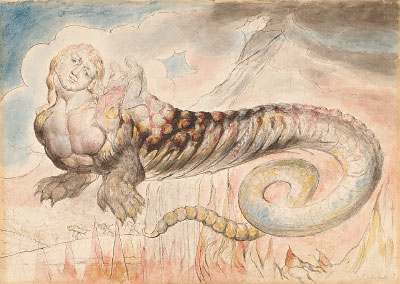Going Down with Geryon
From Dante Inferno Canto XVII
. The face was as the face of a just man, Its semblance outwardly was so benign, And of a serpent all the trunk beside. Two paws it had, hairy unto the armpits; The back, and breast, and both the sides it had Depicted o'er with nooses and with shields. His tail was wholly quivering in the void, Contorting upwards the envenomed fork, That in the guise of scorpion armed its point. The Guide said: "Now perforce must turn aside Our way a little, even to that beast Malevolent, that yonder coucheth him." We therefore on the right side descended, And made ten steps upon the outer verge, Completely to avoid the sand and flame; And after we are come to him, I see A little farther off upon the sand A people sitting near the hollow place. Then said to me the Master: "So that full Experience of this round thou bear away, Now go and see what their condition is. There let thy conversation be concise; Till thou returnest I will speak with him, That he concede to us his stalwart shoulders." Thus farther still upon the outermost Head of that seventh circle all alone I went, where sat the melancholy folk. That from the neck of each there hung a pouch, Which certain colour had, and certain blazon; And thereupon it seems their eyes are feeding. And as I gazing round me come among them, Upon a yellow pouch I azure saw That had the face and posture of a lion. Proceeding then the current of my sight, Another of them saw I, red as blood, Display a goose more white than butter is. And one, who with an azure sow and gravid Emblazoned had his little pouch of white, Said unto me: "What dost thou in this moat? Now get thee gone; and since thou'rt still alive, Know that a neighbour of mine, Vitaliano, Will have his seat here on my left-hand side. A Paduan am I with these Florentines; Full many a time they thunder in mine ears, Exclaiming, 'Come the sovereign cavalier, I found my Guide, who had already mounted Upon the back of that wild animal, And said to me: "Now be both strong and bold. Now we descend by stairways such as these; Mount thou in front, for I will be midway, So that the tail may have no power to harm thee." ...... I seated me upon those monstrous shoulders; I wished to say, and yet the voice came not As I believed, "Take heed that thou embrace me." But he, who other times had rescued me In other peril, soon as I had mounted, Within his arms encircled and sustained me, And said: "Now, Geryon, bestir thyself; The circles large, and the descent be little; Think of the novel burden which thou hast." Onward he goeth, swimming slowly, slowly; Wheels and descends, but I perceive it only By wind upon my face and from below. I heard already on the right the whirlpool Making a horrible crashing under us; Whence I thrust out my head with eyes cast downward. Then was I still more fearful of the abyss; Because I fires beheld, and heard laments, Whereat I, trembling, all the closer cling. Even thus did Geryon place us on the bottom, Close to the bases of the rough-hewn rock, And being disencumbered of our persons, He sped away as arrow from the string.
 |
| Plate 33 of Blake's Illustrations to Inferno from National Gallery of Victoria |
Geryon
From Wikipedia
In the Inferno, the first part of Italian poet Dante's Divine Comedy epic, Geryon has become the Monster of Fraud, a winged beast with the face of an honest man, the paws of a lion, the body of a wyvern, and a poisonous sting at the tip of his tail.[14] He dwells somewhere in the depths below the cliff between the seventh and eighth circles of Hell (the circles of violence and simple fraud, respectively); Geryon rises from the pit at Virgil's call and bears the Poets to the eighth circle. To Dante's horror, the Poets ride on Geryon's back, and he slowly glides around and around the waterfall of the Phlegethon down the great depths to the Circle of Fraud.
Before the entrance to Virgil's version of the underworld in the sixth song of the Aeneid, Geryon is probably also to be found in the description "forma tricorporis umbrae," (the contour of a shade with three bodies) (Book VI, l. 289), in the company of countless other nightmarish creatures. Some read it as a reference to the three-headed monster Cerberus, though.
Geryon:
Going back a milleneon or so we find the Greek Myths:
Geryon: a winged monster with three bodies joined at the waist, killed by Hercules, who stole the monster's cattle as his tenth labour.
Geryon strongly resembles the biblical and Blake serpent:
Now the serpent was more subtil than any beast of the field which the Lord God had made. And he said unto the woman, Yea, hath God said, Ye shall not eat of every tree of the garden?
From Marriage of Heaven and Hell:
Now the sneaking serpent walks
In mild humility.
And the just man rages in the wilds
Where lions roam.
In mild humility.
And the just man rages in the wilds
Where lions roam.
Blake used the serpent in many, many other ways.
No comments:
Post a Comment